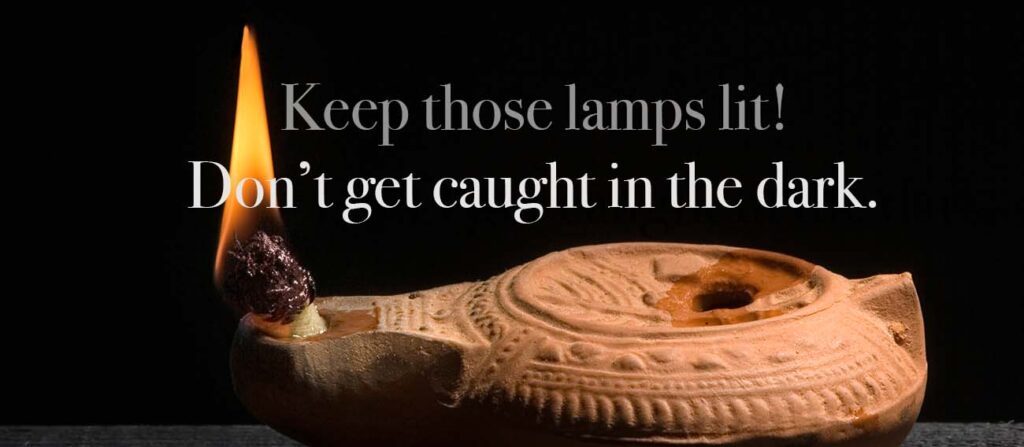If today’s gospel reading isn’t a little bone-chilling for you, then you aren’t reading it right.
The first two readings at mass today pave the way for the gospel of Matthew, where Jesus tells the parable of the Ten Virgins, five of whom “foolishly” didn’t bring oil for their lamps to meet the bridegroom, who was delayed. In the first reading, as in the second, we’re reminded of the finality of life, death, and hope in the resurrection, purchased for us by Jesus through His death and resurrection.
But then the gospel asks us to consider the path between our present and our future destination—death and judgment. How we live now determines the nature of our destination. If we aren’t paying attention and being vigilant along the way, we’ll wind up lost—found unprepared for the bridegroom’s arrival. That’s a terrifying thought.
As someone who loves hiking in the woods, this rings true. If I’m one degree off course in my navigation, I’ll be miles away from where I want to be by the time I reach the end. One degree! That’s all it takes. If I’m not attentive, diligent, and constantly reassessing where I am and where I’m going, that one degree can mean the difference between success and failure in the end.
Let’s analyze the gospel and get deep into what the Lord has to say to us. You can find the gospel reading here (Matt. 25:1-13). I’ll only include segments of it.
“Jesus told this parable: “The kingdom of heaven will be like ten virgins who took their lamps and went out to meet the bridegroom.”
This parable is told in the setting of a wedding feast, which connects to the book of Revelation, where the entire story of creation ends in a wedding feast.
“Let us rejoice and exult and give Him the glory, for the marriage of the Lamb has come, and his Bride has made herself ready… Blessed are those who are invited to the marriage supper of the Lamb.” (Revelation 19:7, 9).
The connection to Revolution may be a clue for us, but Jesus uses another clue for the Jews he was addressing. The climax of the parable occurs at midnight when the long-delayed bridegroom finally arrives.
“At midnight, there was a cry, ‘Behold, the bridegroom! Come out to meet him!’“
The detail of “midnight” wouldn’t have gone unnoticed by the Jews. In fact it would have screamed at them. Midnight is the darkest hour before the day. It’s the turning point from one “season” to the next. We see this in several biblical events. It was at midnight that the angel of death passed through Egypt, destroying the firstborn and preparing Israel for their exodus from bondage. It was at midnight that Samson carried away the gates of Gaza, the two posts, bar and all, put them on his shoulders, and carried them away to Hebron. It was at midnight that the woman in 1 Kings 2:20 found her son gone and a dead one laid in his place.
Midnight might be seen as the dividing line between life and death, death and resurrection. So when Jesus says that the bridegroom arrived “at midnight,” he is underlining a significance to this lesson that the Jews of his time would not have overlooked. In fact, it would have screamed at them.

What about us? Are we hearing Our Lord when he says, “Stay awake, for you know not the hour or day,” or are we like the foolish virgins in today’s gospel? “We should understand Our Lord’s warning, that we will not know the day or the hour of His arrival, in light of what we find in Revelation 3:3, “Remember how you have heard and received (the Gospel, the Truth); keep it, and repent. If you are not watchful I will come like a thief, and you will not know the hour I will come.”
The foolish virgins were not foolish enough to forget the lamps but only the oil. That they have their lamps shows us that they aren’t ignorant or stupid. They know the right thing to do, but they aren’t being diligent about doing it well, or doing it right. They’re complacent and half-hearted about their obligations to the bridegroom on this momentous event of the wedding.
“Since the bridegroom was long delayed, they all became drowsy and fell asleep…”
As we wait for the Lord’s return, we become careless and lazy. It’s easy to get sloppy on this Catholic adventure—this spiritual journey. We often remember our lamps, but we neglect to bring oil for them because we’re not paying attention, become complacent, and forget to take the journey seriously. We may become lax in our prayer life or in the practice of virtue. We may skip the occasional mass on a Sunday or a holy day of obligation. We may say rosaries every day but not with due reverence or any meditation on the mysteries (what’s the point, then?). It’s a natural failure for all of us. We’re human, and sin has made us stupid, weak, and lazy. That’s why Jesus gives us this parable: to remind us to stay sharp, to pay attention, and to take the journey seriously.
“Watch! Because you don’t know the day or the hour that I’ll arrive.”


